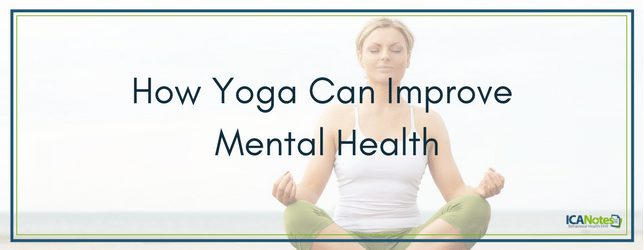How Yoga Can Improve Mental Health

Modern life, with all its advantages, has also brought with it an upswing in those suffering from a wide range of mental health issues. The National Alliance on Mental Illness reports that over 40 million adults in our country, approximately one in five, experience some kind of mental illness in any given year.
When facing issues such as depression, stress, PTSD or other mental challenges, traditional therapies such as medication and counseling are often recommended — and very successful. However, recent studies are showing that alternative therapies, such as yoga, can be of significant benefit as well.
Once dismissed as more of a “New Age” pseudo-therapy akin to homeopathy, yoga’s acceptance as a viable mental health treatment is growing steadily. If you’re exploring ways to address mental health issues, here’s how it can benefit you.
Yoga, Depression and Anxiety
While yoga is most closely associated with its various poses, or asanas, it also incorporates controlled breathing and moments of conscious relaxation or meditation. When combined, these create what researchers call a “relaxation response.”
When you have this type of response, your body experiences measurable biological changes. For instance, when focusing on holding poses and deep breathing, adrenaline levels begin to fall. Fatty acids and sugar in the bloodstream start to follow, and sodium leaves cells. These effects help relax your brain, muscles and heart, raising oxygen levels in your bloodstream and lowering blood pressure.
When you make yoga a consistent part of your therapy, these effects become stronger over time. Research is showing that these biological changes, coupled with the calming effects of meditation, significantly drops your stress response. In turn, those who suffer from depression and anxiety report that these changes lead to a reduction in symptoms, allowing them to feel calmer, more focused and energized.
While many practice yoga by themselves, research is also showing a benefit to practicing it with others. When in a group setting, the additional stress of facing mental health issues alone is greatly reduced. People report feeling a sense of support even if they aren’t interacting with others.
Yoga’s Effects on Other Types of Mental Health
Yoga’s benefits don’t stop with anxiety and depression. Here are some ways yoga is becoming a viable part of treatment for other types of mental health concerns:
- PTSD — For those suffering from post-traumatic stress disorder, the significant reduction in stress and its effects on your body through yoga practice is theorized to have an impact on its symptoms.
- Eating Disorders — Studies have shown that adolescent girls with eating disorders saw decreased anxiety, depression and had a stronger body image when they practiced yoga regularly.
- Psychiatric Disorders — Sufferers of schizophrenia and psychosis found a reduction in symptoms and reduced negative thoughts following a yoga therapy program.
Add Yoga to Any Mental Wellness Plan
If you’re experiencing stress, anxiety or any other mental health issues, integrating yoga into your treatment could prove to be very beneficial — but just like when implementing any new activities into your health regimen, it’s smart to speak with your doctor first before beginning your yoga practice. With even the most basic types showing valuable results, though, it’s worth your time to give yoga a chance to help with your mental health recovery plan.
